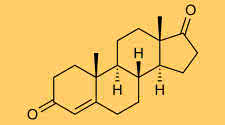Androstenedione & Testosterone: Get all the Facts about Andro Supplements

Sammy Sosa and Mark McGwire in Sports Supplements
Many in the mainstream press have given androstenedione the same treatment they've afforded real anabolic steroids: In their haste to make a story, sensationalism has once again taken precedence over reality. The press obviously doesn't know who to query as experts, but I guess they're no more to blame for that than the baseball commissioner and his office's medical advisers. Sadly, though, for potential consumers of cutting-edge nutritional products, misinformation about androstenedione and other supplements has circulated almost completely unchallenged, and before the record can beset straight the subject disappears from the media radar.
Here's what the mainstream press missed
Is androstenedione a steroid? Absolutely and unquestionably, as anyone with even an elementary knowledge of biochemistry or physiology could tell you.Is it an "anabolic steroid" as defined in medical texts and research papers or by any regulatory agency? Absolutely not.
Is taking androstenedione the same thing as taking testosterone? Absolutely not. Androstenedione has not been shown in any research to produce anabolic and androgenic effects sufficient to classify it as such. That's one reason why androstenedione is not classified as a drug by any medical or scientific organization or by any federal regulatory agency (e.g., the FDA) or by any regulatory organization or federation that has banned it. Calling androstenedione a drug is therefore inappropriate and misleading and could have potentially defamatory implications.
Why hasn't the press been on Sammy Sosa's case about his supplement usage, whatever it is? Wouldn't Sosa's great improvement in performance merit a bit more scrutiny than a naturally huge guy who's consistently been blasting balls out of parks ever since he entered the league? McGwire is big - bodybuilder big - and he may therefore be an easier target. The conventional mainstream wisdom seems to be that McGwire could only attain his size and strength by taking drugs.
We might ask why the same press that was rabid in their attacks on McGwire and androstenedione have done so little to investigate the use of true anabolic steroids in baseball, the real "dirty little secret," as Los Angeles Times columnist Randy Harvey coined it. Harvey quotes an agent who represents some of baseball's most prolific sluggers as estimating that perhaps 30% of players use steroids. Are mainstream investigative journalists looking into that claim? No.
Remember, the medical scientific community often represented in the media actually denied, until just over a decade ago, that real anabolic steroids could contribute significantly to increases in muscle mass or strength. Yet, according to these same experts, steroids are now suddenly everywhere, making monsters out of mortals.
With regard to androstenedione's toxicity, there are no studies to speak of. So, of course, long-term toxicity is both unknown and difficult to predict. However, androstenedione is a natural substance. The body has multiple metabolic pathways into which it could be directed, and it's easily excreted. It is certainly not acutely toxic. I surmise that thousands of athletes have taken androstenedione, yet how many reports of hospital admissions (or adverse reactions of any kind) have there been in the midst of the media frenzy? Real anabolic steroids - especially the oral varieties - are definitely more dangerous and have well-known toxic effects, yet how many horror stories have you heard about them?
There are indeed too few published data on which to base a scientific opinion of the efficacy of andro.
Finally, bodybuilders have always been the trend setters with everything that can potentially affect muscle mass and body composition. They'll try anything (ask those old-timers who used to shove liver into blenders). They trust their own observations and those of their iron comrades. They leave the explanations and details of what works and why to researchers who might be interested enough to follow up later. Considering that many of these often-quoted medical "experts" adamantly long denied that athletes needed more protein in their diets, these professionals seem to be a little slow on the uptake.
Endocrinology, even just that of the sex hormones, is incredibly complex. "Prohormones" (substances that can be converted into hormones may help some people, but not others: they may cause undesirable effects in some people that are absent in others. Overall, prohormone effects are likely to be mild and subtle. Bottom line: if athletes feel that a supplement helps them, then they're going to use it. Period. It's the old "money talks, bulls-t walks" scenario. By this measure, androstenedione seems to be hanging in there.